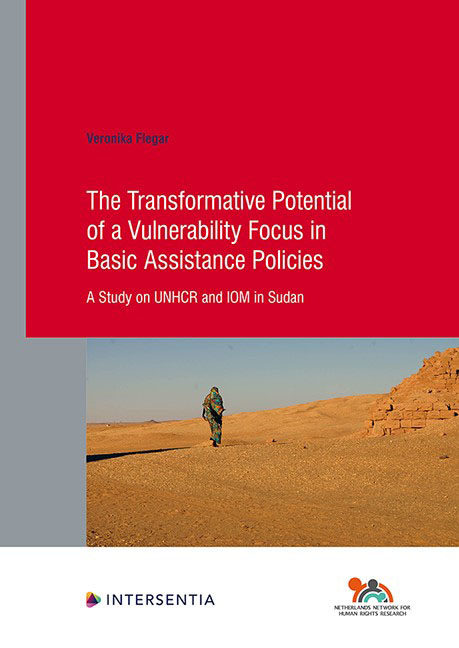 The Transformative Potential of a Vulnerability Focus in Basic Assistance Policies
The Transformative Potential of a Vulnerability Focus in Basic Assistance Policies Book contents
- Frontmatter
- Dedication
- Preface and Acknowledgements
- Contents
- List of Abbreviations
- List of Tables
- List of Figures
- Chapter 1 Introduction
- PART I NORMATIVE AND EMPIRICAL THEORY
- PART II BACKGROUND TO THE CASE STUDIES
- PART III CASE 1: ASSESSING AND ADDRESSING VULNERABILITY AT UNHCR KHARTOUM
- PART IV CASE 2: ASSESSING AND ADDRESSING VULNERABILITY AT IOM KHARTOUM
- PART V
- Bibliography
- Samenvatting
- Summary
- About the Author
- Human Rights Research Series
Chapter 7 - The Design of the Vulnerability Assessment for Basic Assistance at UNHCR Khartoum
Published online by Cambridge University Press: 11 November 2021
- Frontmatter
- Dedication
- Preface and Acknowledgements
- Contents
- List of Abbreviations
- List of Tables
- List of Figures
- Chapter 1 Introduction
- PART I NORMATIVE AND EMPIRICAL THEORY
- PART II BACKGROUND TO THE CASE STUDIES
- PART III CASE 1: ASSESSING AND ADDRESSING VULNERABILITY AT UNHCR KHARTOUM
- PART IV CASE 2: ASSESSING AND ADDRESSING VULNERABILITY AT IOM KHARTOUM
- PART V
- Bibliography
- Samenvatting
- Summary
- About the Author
- Human Rights Research Series
Summary
This chapter presents the case study's findings regarding the design of the vulnerability assessment for basic (multipurpose cash grant) assistance at UNHCR Khartoum. The chapter first describes the vulnerability assessment itself (7.1), then presents how respondents have struggled with the procedural and substantive administrative dilemmas when designing the vulnerability assessment (7.2), subsequently outlines the contextual constraints perceived as relevant by respondents involved in the design of the vulnerability assessment (7.3) and ends with a short summary in the form of concluding remarks (7.4).
The findings presented in Section 7.1 are based on policy documents and sometimes complemented by information from my participant observation. In this section, interview quotes are merely used for illustrative purposes (for instance, if respondents were explicitly asked to clarify elements of the vulnerability assessment that had been unclear in the policy documents).
The findings presented in Sections 7.2 and 7.3 rely on interviews with four respondents that were directly involved in the design of the vulnerability assessment for basic assistance at UNHCR Khartoum. This includes all the relevant persons who were still working at UNHCR Khartoum at the time of the field research. Where the interview transcripts/notes contained gaps on relevant information that had become apparent during participant observation, the sections seek to nevertheless provide this information through field note references. The sections attempt to present as much raw data as possible without making the text unreadable. Where quotes were relevant to several themes/concepts the quote was merely used once (usually where I found it to be most relevant) and subsequently referred to it in a footnote in other sections where the quote could equally have served to illustrate a certain point.
Some issues were raised and elaborated upon by several respondents while other issues were merely mentioned on the sidelines or were only perceived as relevant by one or few respondents. I tried to indicate this in the text for as much as possible in an attempt to distinguish what might merely be the opinion of a single person and what might be a more general issue.
Although the personal/professional characteristics of respondents are not the focus of the present study, a few elements are important to keep in mind.
- Type
- Chapter
- Information
- The Transformative Potential of a Vulnerability Focus in Basic Assistance PoliciesA Study on UNHCR and IOM in Sudan, pp. 141 - 162Publisher: IntersentiaPrint publication year: 2020


